
|
D.O.A. (1949/1950)
In Rudolph Maté's nihilistic, classic film
noir detective story (also noted as 1949) (remade as Color Me
Dead (1969) and as D.O.A. (1988), starring Dennis Quaid
and Meg Ryan in a completely-revised story):
- the famous unexpected opening involved 33 year-old
income tax accountant/notary public Frank Bigelow (Edmond O'Brien)
from Banning, CA; filmed from behind, Bigelow entered the Homicide
Division of a Los Angeles police station to report a murder: ("I
want to report a murder") - speaking almost from beyond
the grave; the doomed Bigelow gave a classic reply when asked who
was murdered by the Police Captain (Roy Engel) - he said:
"I was"; to Frank's surprise, the Captain had already been
alerted about Bigelow with an APB (All-Points Bulletin Missing Persons
Report) from Inspector Bannet in the Homicide Division in San Francisco
- told in flashback, Bigelow's blonde secretary Paula
Gibson (Pamela Britton) was interested in a serious relationship
with him, although he kept putting her off (until the film's conclusion
when it was too late); when she had asked to accompany him to San
Francisco for his vacation - she realized she was crowding him: "You'll
take me with you, won't you? You will, won't you, or am I crowding
you?...Maybe you do need this week away alone? Maybe we both do.
I know what's going on inside of you, Frank. You're just like any
other man, only a little more so. You have a feeling of being trapped.
Hemmed in, and you don't know whether or not you like it"; he
rationalized his refusal to get serious: "I don't want you to
get hurt, darling. More than anything in the world, I don't want
you to get hurt"
- the sequence of a doctor's office visit after a night
of carousing in a jazz or "jive" night-club
("The Fisherman") during the start of his one-week vacation
in San Francisco; he complained of a "bellyache" - but
then a subsequent toxology report was even more shocking: "Our
tests reveal a presence in your body of a luminous toxic matter...
A poison that attacks the vital organs...Your system has already
absorbed sufficient toxin to prove fatal. I wish there was something
that we could do...There is nothing anyone can do. This is one of
the few poisons of its type for which there is no antidote" -
Bigelow surmised that he had been fatally
poisoned via radiation by iridium (with a lethal dose of a glow-in-the-dark "luminous
toxin" ), when his drink in The Fisherman
was swapped and doctored; Bigelow was told
that he was already "dead" and that he had maybe a day
or a week or two to live
- relayed by Paula, Bigelow was told about an urgent
phone call (during his absence) from owner Eugene Phillips of the
Los Angeles-based Phillips Importing and Exporting Company; soon
after the attempted contact, the day before - suspiciously - Phillips had
allegedly committed suicide by leaping off the balcony of his high-rise,
six-story apartment; two days earlier, he was in "a pretty bad
jam" and faced prison - he had been arrested (but then released
on bail) for selling a shipment of stolen iridium (a costly rare
metal), although Eugene didn't know that he had been framed and the
deal was actually made by company associate George Reynolds to a
dealer/gangster named Majak (Luther Adler) six months earlier in
Palm Springs, CA; however, Reynolds had since disappeared; if the
original bill of sale surfaced, it would show that Reynolds was the
dealer-seller and would face a long and stiff prison term, not Eugene.
That would discredit Eugene's apparent suicide. The critical bill
of sale could prove that the authorized transaction (with a bill
of sale) was not made by Eugene at all - and was not the motive for
Eugene's 'suicide.' However, it appeared that Reynolds (or someone
else, revealed later!) had stolen or destroyed the bill of sale,
and people involved were being eliminated
- the memorable film debut of Beverly Garland (Campbell)
as feisty Miss Foster, the Phillips Company secretary, who knew all
about the evil-doings of her corrupt associates
- the giggling, psychotic character of Majak's gangster-henchman
Chester (Neville Brand): with the words: "Don't get cute. I'm
just itchin' to work you over!...I'm gonna blow your guts out... " [Note:
This was reminiscent of Richard Widmark's Tommy Udo from Kiss
of Death (1947)]. As Chester drove off with Bigelow to eliminate
him because he knew too much about Majak's nefarious dealings, he
boasted: "I done jobs like this before. I knocked off guys
I could like. But I don't like you, Bigelow. I never liked that puss
of yours from the minute I seen it. Yeah, I'm gonna enjoy this...I
think I'll give it to you right in the belly. Takes longer when you
get it in the belly. It's nice and slow. That's the way I want to
see you go, Bigelow. Nice and slow" - Bigelow escaped and Chester
was shot dead by a policeman in a drug store
- the revelation that brother-in-law Stanley also turned
up poisoned (with only a few days to live), after he had dinner with
his sister-in-law Mrs. Phillips (Lynn Baggett) and Halliday, and
confronted them with an incriminating letter of the two year affair
between Halliday and Eugene Phillip's wife
- the discovery that - in reality - Eugene had been
pushed off the balcony to his death by the company's main financial
officer/comptroller Mr. Halliday (William Craig) because Eugene had
just found out about the two year affair going on between Halliday
and his own wife; widowed Mrs. Phillips and her conspiratorial secret
lover Halliday faced a possible murder conviction of plotting to
kill Eugene; all evidence of the sale of iridium six months earlier
for Phillips' business was being systematically eliminated by the
two of them, it appeared, as a cover-up or diversion for the murder
- Mrs. Phillips admitted to stealing the bill of sale herself, and
claimed that anyone else who was involved with or could prove that
there was a bill of sale for the illegal substance was to be eliminated
- Mrs. Phillips confessed everything to Bigelow about
why he had been targeted with the poison (administered by Halliday
in SF):
"My husband had no reason to commit suicide. Halliday was desperate.
After he killed my husband, he found out about the phone calls to you.
He thought you spoke to him. That you knew enough to involve him"
- the scene of Bigelow's crazed, gun-blasting face-off
with slick but ruthless murderer Mr. Halliday as he left his downtown
LA office and was shot multiple times on the stairway
- the return to the police station, after the film's
lengthy flashback, when Bigelow finished describing how he had just
solved his own murder case: ("All I did was notarize a bill
of sale. But that piece of paper could have proven that Phillips
didn't commit suicide. He was murdered. And that's why Halliday poisoned
me") - Bigelow learned that he was killed because he inadvertently
and innocently notarized a bill of sale for the stolen iridium
|
The End of the Flashback: Back At the Police Station
|

|
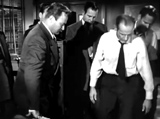
|
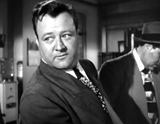
|
|
Captain: "Better make it 'Dead On Arrival'"
|
- the equally famous closing exchange after Bigelow
fell dead to the floor and the Deputy asked: "How shall I
make out the report on him, Captain?"; the Captain responded: "Better
make it 'Dead on Arrival'"
- in close-up, Bigelow's Missing Persons report from
San Francisco was stamped: D.O.A., before the end credits
|

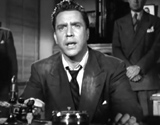
"I want to report a murder...I was (murdered)"

Paula
(Pamela Britton)

The Fateful Drink Swap in a SF Nightclub
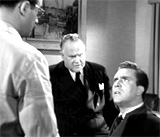
The Toxology Report

Phillips Company Secretary Miss Foster (Beverly Garland)


Chester
(Neville Brand)
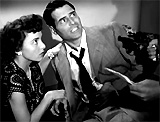
Stanley Phillips Also Poisoned After Revealing Incriminating
Letter

The Deadly Shootout
With Halliday Outside His Downtown LA Office

Missing Persons Report Stamped D.O.A.
|












